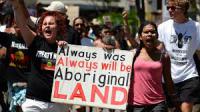Scholars of Australian Studies will hold a two-day conference in Bonn on October 9 and 10 focussed on one of the most controversial government actions of the past decade, the ongoing intervention in Aboriginal lives in the Northern Territory. Both major political parties, the governing ultra-conservative Liberal-National coalition of Prime Minister, Tony Abbott, and the heavily trade union influenced Labor Party led by Bill Shorten, support the policy. The conference will be on the premises of Bonn University. Click here for details in German and English.
Background
Just before the federal election in 2007, the [conservative] Australian federal government led by John Howard issued the “Northern Territory National Emergency Response” (NTER, commonly known as the "Intervention”) officially in reaction to a report by the local Northern Territory government about the sexual abuse and supposed neglect of Indigenous children. These emergency laws authorised the Australian government to drastically intervene in the self-determination of Indigenous communities. Among the measures taken were an extreme of police and military presence in the respective communities, a suspension of the Racial Discrimination Act of 1975, a cancellation of the right to prohibit access by non-community members to areas given to Indigenous communities via the Aboriginal Land Rights (Northern Territory) Act of 1976, the abolition of the consideration of Indigenous customary law, the mandatory allocation of social security contributions, the prohibition of alcohol, the blocking of websites with pornographic content on public computers and a compulsory medical examination of all children in the areas concerned.
The “Intervention” and the political measures subsequently taken have led to heated controversies and continue to divide the Australian nation until the present day. It has put a strain on the relationship between the Indigenous and non-Indigenous population as well as on the relationship between urban Aborigines and remote Indigenous communities. Furthermore, the trauma of the past has been revived and thus the process of reconciliation has been substantially damaged. Anthropologists, lawyers, political scientists, historians, and sociologists have been discussing the “Intervention” and its consequences; at the same time, it has become a theme in art, film, and literature.
The aim of this conference is to examine the “Intervention” and its consequences from the perspectives of a diverse range of disciplines.
A website focussed on the Intervention is concerned australians.
A human rights analysis by the Australian Human Rights Commission
Centre for Aboriginal Economic Policy Research: “The Intervention evaluations instead are consistent with the view that they are both obfuscating mechanisms and techniques of governance designed to allay public concern and normalise the governance of marginalised Indigenous Australian spaces.”

